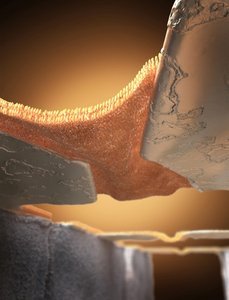Monday, 04 March, 2019
No support needed
Semiconductors

Artists view of freely suspended organic semiconductor thin film (selected front cover in Advanced Materials). Picture: C. Hohmann (NIM)
For the development of new semiconducting devices, the properties of the material need to be clarified. Ideally, the analysis is done without any supporting substrate distorting the measurements. The CeNS scientists Prof Thomas Weitz and Prof Achim Hartschuh now are the first to fabricate freely suspended ultrathin organic semiconductor films.
The last years gave rise to the investigation of several organic semiconductor materials. They promise easier and cheaper fabrication without the need for seldom elements at very good electrical quality. This allows for large-scale production, even via printing processes. Inherent properties such as their flexibility make them promising for the application in new electronic devices such as displays and sensors.
Up to now, a precise characterization of the materials’ properties was difficult. Organic semiconductors were always mounted on top a supporting substrate. The substrate itself as well as the emerging interfaces then influenced for example charge carrier mobility, which could influence and distort the natural processes inherent to the material.
Focusing on this issue, Professor Thomas Weitz and Professor Achim Hartschuh now found a possibility to create freely suspended ultrathin organic semiconductor films. They discuss the characteristics in their latest publication in Advanced Materials.
Only two semiconducting layers
In their experiments, the physicists were able to fabricate organic semiconducting films of only two to three layers of material but spanning several hundreds of nanometers (channel lengths of 100-450 nm and widths of 0.5-1 µm) without a supporting substrate.
In contrast to inorganic semiconductors, their crystal structure is stabilized by van der Waals forces. Such bonds are at least two orders of magnitude weaker than covalent bonds. “Still, our measurements indicate that our suspended semiconductor thin films exhibit high crystal quality,” stresses Thomas Weitz, “the material has excellent stability and electrical properties.”
Freely suspended and electronically decoupled films
Goal of the scientists was to realize highly ordered organic electronically active films, which are as thin as possible and completely isolated from their environment. Temperature-dependent charge transport measurements confirmed that electrical decoupling.
Up to now, freely suspended, few-nm thin semiconductor films with purely van der Waals bond-mediated stability have not been realized and hence are not studied. Their freely suspended semiconducting films are the first of their kind and allow the detailed study of the charge transport processes within the film.
Publication: Freely suspended, van-der-Waals bound organic nm-thin functional films: mechanical and electronic characterization. Schaffroth LS, Lenz J, Geigold V, Kögl M, Hartschuh A, Weitz RT. Advanced Materials, 2019, doi/full/10.1002/adma.201808309
Source:  NIM press release
NIM press release LMU Pressemitteilung auf Deutsch
LMU Pressemitteilung auf Deutsch

